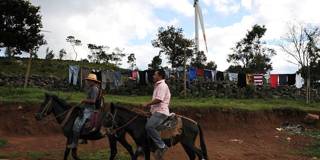If Latin America is to move onto a path toward sustained and inclusive economic growth, it will need to address its lack of high-quality human capital. Addressing that challenge will require an integrated approach that reinforces the roles of family, education, and the physical and social environment.
CARACAS – In the last two decades, Latin America has achieved remarkable social and economic progress. The middle class has grown to historic levels; poverty has been cut almost in half; access to education and health care has been expanded; and prosperity is being shared more widely than ever. As a result, most countries in the region have now achieved “middle-income” status. But their work is far from done.
If Latin America is to move onto a path of sustained and inclusive economic growth, it will need to address numerous challenges – beginning with its lack of high-quality human capital. While Latin America’s young population has enormous potential – 67% of its population is of working age, and population aging is not yet a major concern, as it is in the developed economies – many workers simply lack the skills required to fulfill it.
Inadequate human capital makes much-needed productivity growth difficult to come by. Companies in the productive sectors – which should be creating more and better-quality jobs – struggle to grow, much less compete in the global economy. Continued rapid technological change threatens to widen further the existing gap between available skills and those demanded by the global labor market.

CARACAS – In the last two decades, Latin America has achieved remarkable social and economic progress. The middle class has grown to historic levels; poverty has been cut almost in half; access to education and health care has been expanded; and prosperity is being shared more widely than ever. As a result, most countries in the region have now achieved “middle-income” status. But their work is far from done.
If Latin America is to move onto a path of sustained and inclusive economic growth, it will need to address numerous challenges – beginning with its lack of high-quality human capital. While Latin America’s young population has enormous potential – 67% of its population is of working age, and population aging is not yet a major concern, as it is in the developed economies – many workers simply lack the skills required to fulfill it.
Inadequate human capital makes much-needed productivity growth difficult to come by. Companies in the productive sectors – which should be creating more and better-quality jobs – struggle to grow, much less compete in the global economy. Continued rapid technological change threatens to widen further the existing gap between available skills and those demanded by the global labor market.